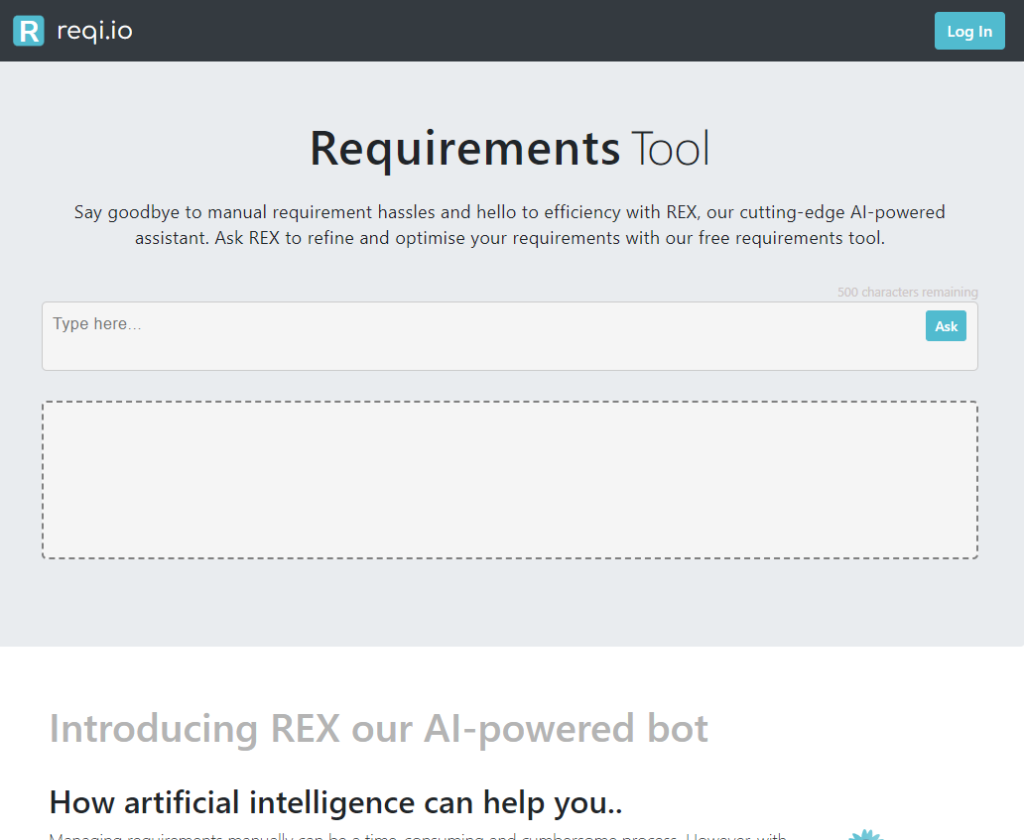In an era where technological advancements redefine the boundaries of possibility, the role of Artificial Intelligence (AI) in transforming traditional methodologies is undeniably significant. Among the myriad applications of AI, its integration into software development, especially within the nuanced domain of requirements management, marks a pivotal evolution. For systems engineers, the fusion of AI technologies with the rigorous processes of software development life cycle (SDLC) promises not just enhanced efficiency but a paradigm shift in how projects are conceived, analyzed, and executed.
AI Requirements management—an intricate cornerstone of systems engineering—has long grappled with complexities ranging from stakeholder communication to ensuring compliance standards in software engineering. The advent of AI-driven test case creation, automated requirements generation, and intelligent requirements management heralds a new dawn, offering unparalleled precision and dynamism in handling project mandates.
This convergence of AI innovations in systems engineering does not merely streamline existing processes but reimagines them, enabling engineers to navigate the intricacies of requirements analysis techniques with newfound agility. By leveraging machine learning in engineering and natural language processing (NLP) for documentation, systems engineers are now equipped to transcend traditional barriers, achieving predictive analytics in project management, and enhancing software quality with AI.
As we delve into the transformative potential of AI in requirements management, this article aims to unravel the complex interplay between AI applications and the disciplined framework of systems engineering. From exploring efficient software development practices empowered by AI to forecasting future trends in systems engineering, we embark on an insightful journey to uncover how artificial intelligence is reshaping the landscape of systems engineering, heralding a future where technology and human expertise converge to catalyze unprecedented growth and innovation.
Engaging with these emerging trends is not just about adopting new technologies but embracing a forward-looking perspective that anticipates the evolving demands of the field. For systems engineers and project managers alike, understanding and integrating AI innovations into the fabric of requirements engineering is pivotal, laying the groundwork for a more connected, intelligent, and responsive approach to software development.
Table of Contents
- The Evolution of Requirements Management: Embracing AI for Streamlined Processes
- Challenges and Considerations in AI-Enhanced Requirements Management
- Navigating the AI-Enhanced Path: Practical Applications and Transformative Outcomes
- AI Tool Selection and Implementation Tips
- The Path Forward: Embracing AI in Requirements Management
- Charting the Future: AI’s Expanding Role in Requirements Management and Beyond
- Embracing the Future
- Emerging Technologies to Watch
- Embracing the Future with AI in Requirements Management: A Call to Action
The Evolution of Requirements Management: Embracing AI for Streamlined Processes
The journey of requirements management within the field of systems engineering has been one of continuous evolution. Traditionally characterized by manual documentation, intensive stakeholder meetings, and a significant investment of time and resources for ensuring accuracy and completeness, the process has often been prone to human error and inefficiencies. However, the landscape began to shift with the integration of technology, and more recently, the advent of artificial intelligence (AI) has marked a significant leap forward.
Automating the Mundane with AI
At the forefront of this transformation is AI’s capability to automate the mundane yet critical aspects of requirements management. Automated requirements generation and AI-driven test case creation are not just buzzwords but have become vital tools that offer a glimpse into the future of efficient software development practices. By automating these processes, systems engineers can now redirect their focus towards more strategic tasks, ensuring that projects not only meet but exceed stakeholder expectations.
Enhancing Accuracy and Efficiency
AI technologies such as machine learning in engineering and natural language processing (NLP) have significantly enhanced the accuracy and efficiency of requirements management. For instance, NLP for documentation allows for the precise analysis of project requirements from vast amounts of textual data, identifying key patterns, needs, and potential conflicts with unparalleled speed and accuracy. This capability not only streamlines the requirements documentation process but also ensures a higher level of consistency and reliability in the output.
Predictive Analytics: A Game Changer for Project Management
Incorporating predictive analytics in project management has arguably been one of AI’s most notable contributions to the field. Through the analysis of historical data and ongoing project metrics, AI algorithms offer insightful forecasts that aid in risk assessment, resource allocation, and deadline adherence. This predictive capacity allows project managers and systems engineers to make informed decisions, anticipate potential hurdles, and implement preemptive measures to mitigate risks, resulting in more successful project outcomes.

Compliance and Standards Recommendations
Compliance with industry regulations and standards is a critical aspect of systems engineering that often presents a considerable challenge. Here, AI’s potential to suggest compliance standards for a given industry is revolutionary. By automatically identifying the relevant regulatory requirements and integrating them into the project’s framework, AI ensures that the final product not only meets but adheres to the highest standards of quality and compliance.
The Role of AI in Collaborative Endeavors
Beyond the technicalities, AI also enhances collaboration and communication among project stakeholders. Intelligent requirements management tools empower teams with real-time updates, actionable insights, and a centralized platform for interaction, ensuring that all parties are aligned with the project’s objectives and progress. This enhanced collaboration further amplifies the efficiency and effectiveness of the requirements management process.
Challenges and Considerations in AI-Enhanced Requirements Management
Integrating Artificial Intelligence (AI) into requirements management processes presents a significant opportunity for organizations to enhance efficiency and project outcomes. However, navigating this transition also involves confronting a range of challenges and considerations. From ensuring data security to balancing automation with human intuition, it’s vital for systems engineers and project managers to strategize effectively. This table outlines key challenges and offers recommendations to mitigate potential obstacles on the path to successful AI integration.
| Challenge/Consideration | Description | Recommendations |
|---|---|---|
| Data Privacy and Security | Ensuring the confidentiality, integrity, and availability of data processed by AI tools. | Implement rigorous data governance frameworks and choose AI solutions that prioritize security and comply with relevant data protection regulations. |
| Initial Investment and ROI Concerns | High upfront costs associated with software acquisition, integration, and team training. | Carefully evaluate the long-term benefits and potential efficiency gains against the initial investment to assess the return on investment (ROI). |
| Choosing the Right Tools | Difficulty in selecting AI tools that align with specific organizational needs and existing systems. | Conduct thorough research and comparisons, focusing on features, compatibility, scalability, and user reviews. Pilot testing is highly recommended. |
| Human Oversight | The need for human judgment to interpret AI recommendations, manage exceptions, and ensure strategic alignment. | Maintain a balance between automation and human expertise. Provide adequate training to staff to work alongside AI tools effectively. |
The theoretical potential of Artificial Intelligence (AI) in revolutionizing requirements management is compelling, but the true measure of its impact lies in practical application and the transformative outcomes it delivers. Systems engineers are at the forefront of adopting AI to tackle some of the most persistent challenges in the field, achieving remarkable efficiency, accuracy, and strategic foresight in software development processes.
Case Studies: AI in Action
Consider the scenario where a global software development team leverages AI-driven requirements management tools to automate the elicitation and documentation process. The team, previously bogged down by the manual interpretation of vast amounts of stakeholder communication, now benefits from natural language processing (NLP) algorithms that precisely extract requirements from emails, meeting notes, and feedback forms. This not only speeds up the initial phases but also enhances the clarity and completeness of the requirements document, reducing the room for error and misunderstanding.
In another instance, predictive analytics are applied to historical project data, offering insights into potential bottlenecks and resource allocation issues before they manifest in ongoing projects. Machine learning algorithms analyze patterns in project timelines, budget expenditures, and change requests to predict project outcomes with remarkable accuracy. This allows project managers to make informed decisions, optimizing workflows and resource distribution to meet deadlines within budget, improving overall project success rates.
AI Tool Selection and Implementation Tips
Choosing and implementing the right AI tools for requirements management is crucial for realizing the technology’s full potential. The process requires a thoughtful approach, from accurately assessing organizational needs to ensuring your team is prepared to leverage new technologies. The following table provides actionable tips to guide systems engineers and project managers through the selection and implementation phases, setting the stage for a smoother transition and more effective use of AI in requirements management.
| Tip | Description | Action Steps |
|---|---|---|
| Assess Your Needs | Identify the specific challenges in requirements management that AI can address. | Document your current pain points and desired outcomes. Define clear objectives for what you want the AI tool to achieve. |
| Research and Compare | Explore available AI tools for requirements management to find the best fit for your organization. | Consider factors like functionality, compatibility with existing systems, user reviews, and cost. Shortlist tools that closely match your needs. |
| Pilot Before Full Implementation | Test the selected AI tool in a controlled environment before widespread deployment. | Choose a small, manageable project for the pilot. Monitor performance closely and gather feedback from users. Adjust your strategy based on the pilot’s outcomes. |
| Train Your Team | Ensure your team is well-equipped to make the most of the new AI tool. | Provide comprehensive training covering both the technical aspects of the AI tool and its application in your processes. Consider ongoing support and refresher sessions. |
| Measure and Adjust | Evaluate the impact of the AI tool on your requirements management process and make necessary adjustments. | Set up metrics for success based on your initial objectives. Regularly review these metrics and seek feedback from the team to identify areas for improvement. |
Advancing Towards Automated Compliance
The integration of AI for compliance and standards recommendations showcases one of the most valuable applications in regulated industries such as healthcare, finance, and aerospace. An AI-enhanced system analyzes the project scope and automatically identifies relevant regulatory requirements, integrating them into the development process from the outset. This proactive approach ensures adherence to compliance standards, significantly reducing the risk of post-development regulatory issues and associated costs.
New AI tools are coming to the market fast. Reqi’s own new free AI-powered assistant, designed to revolutionize requirements management is REX. During beta testing, you can explore its capabilities for quick idea testing and generating requirements from text screen grabs. Although still in development, REX offers a great starting point for exploring possibilities in requirements management. Try it out now at REX.
Unlock the Power of AI in Requirements Management
If you’re intrigued by the transformative potential of AI in requirements management, look no further than the Business Analysis 101: Requirements Mastery with ChatGPT course on Udemy UK|275246. Crafted by an expert instructor with over 30 years of experience and a track record of success, this course is your gateway to mastering the art of effective requirements.
Enroll now and unlock your projects’ full potential with AI-augmented requirements and User Stories. Because in the digital age, effective requirements management is more critical than ever.
Enhancing Test Case Creation
The automated generation of test cases based on accurately elicited requirements exemplifies AI’s capacity to bridge gaps between development phases seamlessly. Systems engineers utilizing AI for test case creation report a substantial reduction in time and effort required for testing, alongside improvements in coverage and defect detection rates. This not only accelerates the testing phase but also contributes to a higher quality final product, enhancing customer satisfaction and trust.
Enhancing Collaboration and Communication
The implementation of intelligent requirements management tools enhances project collaboration and communication, establishing a shared understanding among stakeholders, developers, and project managers. These tools offer real-time updates, dashboards, and notifications, ensuring that every team member is informed of changes, progress, and potential issues promptly. This fosters a collaborative environment where decisions are data-driven, and project alignment is maintained throughout the development lifecycle.

The Path Forward: Embracing AI in Requirements Management
The journey towards fully integrating AI within requirements management processes is ongoing, with new advancements and applications emerging regularly. Systems engineers and project managers are encouraged to stay abreast of these developments, experimenting with and adopting AI tools and techniques that align with their project needs and organizational goals.
The practical applications of AI in requirements management underscore its transformative impact on the field of systems engineering. By automating routine tasks, enhancing accuracy, providing predictive insights, ensuring compliance, and fostering collaboration, AI technologies are setting new standards for efficiency and effectiveness in software development. As we look to the future, the continued integration of AI promises not only to address current challenges but also to redefine what is possible in systems engineering and project management.
Charting the Future: AI’s Expanding Role in Requirements Management and Beyond
As we delve deeper into the integration of Artificial Intelligence (AI) within the systems engineering landscape, it’s clear that the initial successes and transformative outcomes are only the beginning. The rapid advancements in AI technologies promise not only to further refine requirements management processes but also to redefine the entire spectrum of systems engineering and software development practices. Looking ahead, we can anticipate several key trends and innovations that will shape the future of this exciting intersection.
Continuous Learning and Adaptation
One of the most significant future directions for AI in requirements management is the evolution toward more sophisticated machine learning models that offer continuous learning capabilities. These models will not only adapt to the subtleties of specific projects and domains but also evolve from experiences across multiple projects. This means AI systems could become increasingly accurate at predicting project outcomes, identifying potential requirements issues before they arise, and suggesting optimal paths for development based on historical data and current project metrics.
Enhanced Natural Language Processing
Natural language processing (NLP) technologies are set to become even more advanced, with the potential to understand context and semantics at levels mirroring human comprehension. This improvement will greatly enhance the requirements elicitation process, allowing for more precise extraction of requirements from natural language inputs. Moreover, as NLP becomes more nuanced, it can facilitate more natural and effective communication among globally distributed teams and stakeholders, bridging language barriers and cultural nuances.
Integrating Ethics and Bias Mitigation in AI Tools
As AI tools become more central to the requirements management process, integrating considerations of ethics and bias mitigation will become crucial. Ensuring that AI systems are not only efficient but also fair and unbiased in their analysis and suggestions will be vital, particularly in projects with significant social impacts. This focus on ethical AI will involve developing frameworks and standards for AI in systems engineering, emphasizing transparency, accountability, and inclusiveness.
AI-Augmented Decision Making
The future will likely see AI not just as a tool for automation but as a partner in decision-making processes. AI’s role will expand to provide systems engineers and project managers with insights, recommendations, and alternatives for critical decisions. By synthesizing data from various sources, including market trends, project performance data, and stakeholder feedback, AI can offer a comprehensive analysis that supports more informed and strategic decision-making.
Virtual Collaboration and Immersive Requirements Engineering
The advent of virtual reality (VR) and augmented reality (AR) technologies, combined with AI, could revolutionize how teams collaborate and engage in the requirements engineering process. Imagine virtual project rooms where stakeholders and engineers, irrespective of their physical locations, can interact with virtual representations of project requirements, designs, and prototypes. These immersive environments, powered by AI, could facilitate a deeper understanding of project goals, enhance creativity, and strengthen team cohesion.
Embracing the Future
The journey into the future of AI-enhanced requirements management is both exhilarating and challenging. As systems engineers, embracing these advancements requires an openness to change, continuous learning, and a proactive stance on integrating new technologies into existing processes. The potential benefits—increased efficiency, improved accuracy, enhanced team collaboration, and more informed decision-making—underscore the importance of this technological evolution.
As we chart the course for this exciting future, the collaboration between AI experts, systems engineers, project managers, and stakeholders will be pivotal. Together, they can ensure that the integration of AI into requirements management not only enhances technical outcomes but also aligns with broader organizational goals and ethical standards, paving the way for a future where technology and human expertise converge to achieve remarkable results in systems engineering and beyond.
Emerging Technologies to Watch
The landscape of requirements management is poised for further evolution, thanks to advancements in various emerging technologies. Beyond AI, innovations like blockchain, augmented reality (AR), and quantum computing offer promising avenues for enhancing the precision, security, and efficiency of managing project requirements. This table highlights these technologies, exploring their potential impacts on requirements management and considerations for their adoption. Being aware of these emerging trends can empower organizations to stay ahead of the curve and harness new opportunities for growth and improvement in their projects.
| Technology | Potential Impact on Requirements Management | Considerations |
|---|---|---|
| Blockchain | Provides a secure and immutable ledger for documenting and tracing requirements throughout the project lifecycle. | Explore blockchain platforms that offer easy integration with existing project management tools. Consider the learning curve and infrastructure changes needed. |
| Augmented Reality (AR) | Facilitates immersive visualization of project requirements, enhancing stakeholder understanding and engagement. | Assess the feasibility of integrating AR tools in stakeholder meetings and requirement review sessions. Evaluate the costs and technical requirements. |
| Quantum Computing | Has the potential to significantly enhance data processing capabilities, impacting predictive analytics and AI’s efficiency in requirements management. | Stay informed about developments in quantum computing. Consider partnerships with academic institutions or technology leaders exploring quantum applications. |
Embracing the Future with AI in Requirements Management: A Call to Action
As we’ve journeyed through the transformative potential of AI in requirements management, from tackling traditional challenges to leveraging emerging technologies, it’s clear that the future of systems engineering and software development is intrinsically linked with AI. The path forward requires not only embracing these innovations but also preparing to navigate the complexities they introduce. By understanding the challenges, strategically selecting and implementing AI tools, and staying attuned to the latest developments, organizations can position themselves at the forefront of this evolution.
In the realm of AI-enhanced requirements management, one platform stands out for its dedication to pushing the boundaries of what’s possible: Reqi (Reqi.io). As a leader in integrating AI technologies to streamline and enhance the requirements management process, Reqi offers a suite of tools designed to optimize every phase of project development. From automated requirements generation and intelligent error detection to predictive analytics for project management, Reqi embodies the cutting-edge possibilities we’ve explored throughout this article.
The journey towards fully integrating AI into requirements management is both an exciting opportunity and a complex challenge. Organizations like Reqi are pioneering this space, demonstrating the tangible benefits of AI in improving accuracy, efficiency, and outcomes in project development. For systems engineers, project managers, and all stakeholders involved in the software development lifecycle, exploring platforms such as Reqi can be a significant step towards realizing the full potential of AI in their projects.
As we wrap up our exploration, let’s consider this a call to action. The advancements in AI and emerging technologies offer unprecedented opportunities to redefine the landscape of requirements management and project development. By partnering with leaders in the field like Reqi, embracing innovative tools, and preparing for the challenges of tomorrow, we can all contribute to a more efficient, effective, and successful future in systems engineering.
The integration of AI in requirements management is not just a trend—it’s the future. And the time to act, to learn, and to innovate is now. Let’s move forward with the confidence that platforms like Reqi provide, harnessing the power of AI to transform our projects and ultimately, the impact of our work in the world.







